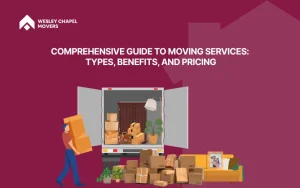Moving companies in Wesley Chapel, Florida, operating within the state, must comply with Chapter 507 of the Florida Statutes, which mandates registration with the Florida Department of Agriculture and Consumer Services (FDACS). This registration requires movers to provide detailed business information and proof of insurance coverage. Specifically, movers must maintain liability insurance of at least $10,000 per shipment to cover potential losses or damages to household goods resulting from negligence.
Florida law requires all moving companies to offer written contracts that clearly outline the services provided, associated costs, and terms of liability. These contracts must disclose any limitations of liability, including the valuation rate, which cannot be less than 60 cents per pound per article. Movers may offer valuation coverage to compensate for loss or damage, but they must inform customers of their rights and the availability of such coverage in writing before providing any moving services.
Engaging a moving company that adheres to these legal requirements ensures a higher level of protection and accountability. Failure to comply with these regulations can result in administrative penalties, including suspension of registration and fines. Therefore, verifying a mover’s compliance with Chapter 507 is a crucial step in planning a secure and lawful move within Wesley Chapel and the broader Florida region.
State-Level Moving Laws in Florida

Florida’s intrastate moving laws focus on regulating service quality and protecting consumer interests through mandatory registration, insurance, and transparent documentation. These laws are enforced by the FDACS and apply to all household movers operating within the state. They set the foundation for fair practices, requiring clarity in service terms and accountability in handling goods.
Licensing and Insurance Requirements
All moving companies operating within Florida must be registered with the Florida Department of Agriculture and Consumer Services (FDACS) before offering intrastate services. Registration under Chapter 507.03 requires the business to provide identifying details, ownership information, and a physical address. Movers must also maintain active liability insurance and cargo insurance with minimum coverage of $10,000 per shipment, according to Chapter 507.04. Additionally, companies must inform consumers about liability terms in writing and offer valuation coverage options such as released value protection (60 cents per pound per article) and full value protection where applicable. Customers are advised to verify the mover’s registration status on the FDACS website before hiring.
Written Estimates and Contracts
Florida law requires moving companies to issue a written estimate before beginning any move. This estimate must itemize the total cost based on either time or weight, depending on the pricing model used. The contract must specify whether it is binding or non-binding. In the case of non-binding agreements, the final charge may not exceed the original estimate by more than 10 percent without written consent from the customer. Section 507.06 mandates that all agreements be clearly documented, including service scope, payment terms, and valuation disclosures. Consumers should retain a signed copy of the estimate and contract for their records.
Consumer Protection Laws
Florida imposes strict consumer protection rules under Chapter 507.07 to ensure fair treatment during household moves. Movers cannot demand a deposit exceeding 110% of the total estimated cost, and must provide a detailed Bill of Lading before loading begins. The Bill of Lading must include delivery dates, inventory of items, agreed rates, and terms of liability. If a dispute arises, consumers can file a formal complaint with FDACS, which investigates violations and may impose administrative penalties. These provisions protect against fraud, unlicensed operators, and service failures.
Moving Brokers Regulations
Moving brokers operating in Florida must also be registered with FDACS and are held to similar standards as moving companies. Brokers must maintain a $50,000 performance bond and clearly disclose their status as intermediaries rather than service providers. They are required to identify the actual moving company handling the move and cannot misrepresent their role. According to Florida regulations, brokers must provide customers with written confirmation of the company performing the move, including licensing and insurance credentials. Consumers should verify both the broker’s and the selected mover’s compliance status before entering into any agreement.
Local-Level Moving Laws in Wesley Chapel/Pasco County (Local Law)

Moving companies operating in Wesley Chapel must comply with local rules set by Pasco County and neighborhood-specific guidelines. These include zoning codes, permit requirements, and HOA-imposed restrictions that affect where, when, and how moving services can be performed. Understanding and following these local laws is essential to avoid delays, fines, or service disruptions.
Code Compliance and Permits
Wesley Chapel movers must adhere to Pasco County’s property maintenance codes, which regulate activities such as parking, loading, and obstruction of public rights-of-way. Operating without the necessary permits or violating these codes can result in civil infractions, with fines up to $5,000 per violation and potential legal action. Repeat offenses or violations posing a significant threat to public health or safety may lead to immediate citations without prior notice. To ensure compliance, movers should verify permit requirements through the Pasco County Permitting Portal.
Homeowners Associations (HOAs)
Many residential neighborhoods in Wesley Chapel fall under the governance of Homeowners Associations, which impose additional restrictions on moving activities. Common HOA rules include designated moving hours, usually limited to daytime windows such as 8 AM to 6 PM, and specific parking instructions for moving trucks. Some associations require advance notice and may restrict truck access to certain community entrances or loading areas. Violating HOA regulations can lead to fines, which vary depending on the association’s bylaws. For instance, unauthorized parking or moving outside permitted hours may result in penalties ranging from $50 to $200. Homeowners should consult their HOA guidelines and coordinate with their moving company to ensure adherence to all rules.
Noise Ordinances
Wesley Chapel, under Pasco County jurisdiction, enforces noise ordinances that restrict loud activity during certain hours. Construction and moving activities that generate noise levels exceeding 55 decibels between 10:00 p.m. and 7:00 a.m. in residential areas are prohibited. Violations can be prosecuted as second-degree misdemeanors, carrying fines up to $500 or imprisonment for up to 60 days. Movers and residents should plan moves during allowed hours and avoid using loud machinery or blocking shared driveways outside those times. These restrictions are designed to preserve residential peace and minimize disruption in densely populated neighborhoods.
Consumer Protection Laws and Best Practices
Florida law protects moving customers by regulating deposits, liability disclosures, and contract transparency. Under Statute 507.09, violations such as failing to provide written estimates or misrepresenting services may result in penalties up to $5,000. Consumers are encouraged to verify mover credentials, understand valuation options, and retain signed documentation.
Deposit Limits
Florida Statute 507.07(8) limits how much a moving company can request upfront to prevent excessive financial demands before services are performed. Movers may not collect more than $100 or 10 percent of the total estimated cost, whichever is less. Violating this rule may result in administrative penalties issued by FDACS.
Key deposit rules under Florida law include:
- Maximum allowed deposit is 100 or 10% of the written estimate, whichever is lower.
- Must be clearly stated in the written estimate provided to the customer.
- No additional fees may be collected before the move beyond this limit.
- Violations may lead to fines up to $5,000 under Statute 507.09.
Liability for Damage
Florida Statute Chapter 507 requires moving companies to provide written disclosure of their liability for lost or damaged household goods before services begin. By default, movers offer released value protection, which limits compensation to 60 cents per pound per item. Customers may also opt for full value protection at an added cost, which entitles them to repair, replacement, or compensation based on the item’s current market value. Movers must clearly explain both options and obtain written confirmation of the customer’s selection to ensure transparency and legal compliance.
Bill of Lading
The Bill of Lading is a legally binding document required by Florida law that serves as both the service contract and receipt for a move. It must include key details such as the name and address of the mover, a description of the services provided, pickup and delivery dates, agreed costs, and the level of liability coverage selected by the customer. According to Statute 507.07, the Bill of Lading must be signed by both the customer and the mover before the moving process begins. This document plays a critical role in resolving disputes, as it defines each party’s rights and responsibilities throughout the relocation.
How do I choose a licensed moving company?
To hire a legally approved moving company in Florida, start by verifying their state registration, insurance status, and contract practices. Follow these steps to ensure compliance and protection during your move:
- Verify FDACS Registration: Use the Florida Department of Agriculture and Consumer Services website to confirm the mover is registered for intrastate service.
- Check Insurance Coverage: Confirm the mover holds valid liability and cargo insurance as required under Florida Statute Chapter 507.
- Request a Written Estimate: Always obtain a written estimate that outlines costs, service scope, and deposit terms before agreeing to any move.
- Review Consumer Complaints: Search the company name on the FDACS database or Better Business Bureau to see if there are unresolved consumer issues.
- Ask for the Bill of Lading in Advance: Ensure the contract includes delivery dates, valuation coverage, and all agreed-upon services.
These guidelines help identify movers who operate within Florida’s legal framework and prioritize consumer protection. In a regulated area like Wesley Chapel, where both state and local compliance apply, Wesley Chapel Movers meets these expectations with full FDACS registration, proper insurance, and adherence to Pasco County’s moving ordinances. Customers looking for a dependable and fully compliant moving experience can confidently rely on Wesley Chapel Mover’s for both residential and commercial relocations.





